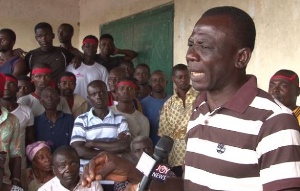 Some aggrieved farmers sharing their concerns
Some aggrieved farmers sharing their concerns
The Peasant Farmers Association of Ghana (PFAG) has questioned the criteria used in selecting the annual national best farmer, which it said has been skewed to favour large-scale farmers.
The group does not understand why large-scale farmers are given juicy prize packages while smallholder farmers and women who constitute majority of farmers are given hoes and cutlasses among other manual farm implement.
It observed smallholder farmers who provide over 80 per of the country’s food and raw materials” are always awarded with hoes, cutlasses, knapsack sprayers, fertilizer and at best, bicycles and motor cycle,” whereas large-scale farmers are given “houses, pickups, tractors, combine harvesters”.
“It must be noted that, whiles large scale farming is by choice in developed countries, in Ghana, it is by privilege, gender and inheritance,” the group said in a statement issued to commemorate this year’s farmers’ day celebration.
According to the PFAG, most women have no choice of expanding their farm size due to land tenure system and difficulty accessing credit for being a woman.
“It would, therefore be unfair for such a woman who has a passion for agriculture to miss the opportunity of winning a house to a man who is privileged to inherit resources, land and also, has access to credit due to availability of inherited collateral,” it said.
The group is thus calling on the Ministry of Food and Agriculture which is responsible for the award scheme to relook at it with the view to improving it to benefit smallholder farmers.
Meanwhile, the farmer-based group is asking the government to review its fertilizer subsidy programme by reducing amount of money put in subsidizing chemical fertilizer.
It wants the government to use the money to support organic fertilizer and sustainable agriculture, which it explained “is economically prudent, environmentally friendly, gender sensitive and climate resilient”.
“Apart from cost to the taxpayer, there is evidence of the effect on health of using too much chemical fertilizer. There is also environmental implications and economic consequences of over reliance on importation since the manufacturing companies are outside Ghana,” the group warned.
Also, while it lauded the government for its investment in food production, it said little investment has been made to ensure postharvest losses.
It said a concerted and deliberate effort is required to reduce postharvest losses in the country, which the group said would go a long way to boost the Ghana Beyond Aid agenda.
“Specifically, the provision of post-harvest management equipment such as small harvesters, processers, cold vans, mobile rice mills and appropriate storage and marketing facilities. Value addition such as processing and marketing should be pursued vigorously to create jobs for the youth,” it mentioned.
PFAG observed the theme for this year’s celebration, Agriculture, Moving Ghana Beyond Aid is a wake-up call all and that the achievement of this agenda will depend on government response to the issues they have raised among others.